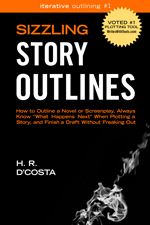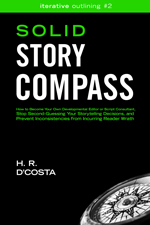Whenever you write a script, you’re building a new story world, with its own set of rules and logic.
This is true even if you’re not writing a screenplay set in a specific historical period like Sherlock Holmes or a science-fiction work like Star Trek.
In other words, even scripts which take place in “real world,” contemporary times follow their own unique set of rules.
What’s credible in a gambling scene in The Hangover is going to radically differ from what’s credible in a gambling scene in movies like Casino or Lucky You.
The rules of your story world are dictated by genre, tone, and the fabric of your characters. And it’s this last one–character–which is the trickiest to get right.
Depending on how you’ve established the makeup of your characters, there are certain actions which are logical for them to take.
However, even seasoned screenwriters are liable to fall into the trap of sacrificing their characters in order to push the plot forward.
For example, in This Means War, two spies use their CIA skills as they compete to win over the heart of Reese Witherspoon.
In the world of this romantic comedy, wasting the government’s money and technology to woo a girl makes perfect sense (unlike say in a spy movie like The Bourne Identity).
But when the two spies, played by Chris Pine and Tom Hardy, infiltrate Reese’s home to do recon, she never notices that they’re in her home because she’s microwaving popcorn while singing “This Is How We Do It.”
There’s nothing in the movie which indicates that Reese’s character is so incredibly obtuse that she wouldn’t realize Pine and Hardy were in her living room. (And if she were so obtuse, it begs the question, how did she get two hot spies interested in her?)
The writers made Reese act stupid in order to pull off the comedy gag, but in doing so, they threw Reese’s character under the bus. Basically, while the actions of Pine and Hardy fit the overall tone of the movie, the actions of Reese Witherspoon didn’t fit her character.
When a character behaves in a certain way because the script requires it, a reader’s credibility monitor immediately sounds an alarm. “Character X would never do that,” it shrieks.
Once that disbelief is triggered, you’ve jolted your reader out of the world you’ve carefully constructed. Even when he returns back to the pages in his hands, he’s likely returning with less emotional investment than he had before.
In an old draft of As Good As It Gets, written in 1992, five years before the film starring Jack Nicholson and Helen Hunt was released, there are several moments in the script which just don’t ring true because the writer sacrificed character for the sake of the plot (the most frequent victim being Helen Hunt’s character, Carol Connelly). All of these incidences disappeared by the time the shooting script was complete, making for a much stronger screenplay.
It’s my hope that by sharing these examples from this early version of As Good As It Gets penned by Mark Andrus, you’ll be better able to identify those moments in your own screenplay draft where you’ve sacrificed character for the sake of your plot.
Onto the examples!
Screenplay Writing Example #1: Carol’s reaction to Melvin’s insult
Melvin’s not the most pleasant of restaurant patrons even on his better days. Carol’s used to the curmudgeon, maybe even enjoying going the distance with him.
But one day, Melvin crosses the line. He tells her, “We’re all going to die soon. I will, you will, and it sure sounds like your son will.”
In the original screenplay draft I read, this is how the scene was written. Pay particular attention to Carol’s reaction:
INT. CORNER RESTAURANT — MORNING
Melvin enters as CAROL picks up a menu and walks him to the corner window table. Melvin pulls out a knife and fork wrapped in a napkin from his pocket.
CAROL
You’re late.
MELVIN
You look really bad today.
Though we don’t know what good is for Carol, and she’s perhaps only thirty, she does look bad — bags under her eyes, a pale, blotchy skin, her hair tightly pulled back, flecked with gray.
CAROL
My son couldn’t breathe last night.
(beat)
Look at the menu.
She hands him the menu, which he doesn’t take.
MELVIN
Two sausages, two bacon, two eggs over easy and coffee.
CAROL
You’ll die soon, you know.
MELVIN
We all will. Your son will, I will…you will.
Carol appears to be hurt by the comment; she pulls back the menu and grabs the utensils on the table.
CAROL
Thanks for asking about my son.
She walks away. Melvin watches her for a moment, then glances out at the street full of people.
Because the plot dictates it, Carol doesn’t eject Melvin from the restaurant. She can’t–not when they still need to interact with each other to keep the story going.
But her reaction shouldn’t be so milquetoast either. It lacks authenticity.
No one can say such a cruel thing to a mother and get away unscathed.
In the movie, Carol becomes–temporarily–just as harsh and abrasive as Melvin. Scary even.
Just the kind of reaction we’d expect from a provoked mama bear:
CAROL
If you ever mention my son again, you will never be able to eat here again, understand? Give me some sign you understand, or leave. Now. Do you understand me…
(adds a truthful label)
you crazy f***? Do you?!
A beat and then Melvin nods, hardly breathing — backing down.
CAROL
Okay, I’ll get your order.
This revised response maintains Melvin’s connection to the restaurant, which is necessary to advance the plot. But even though Carol doesn’t toss him out of the restaurant, she comes close to it. The ferocity of her response stays true to Carol.
Screenplay Writing Example #2: Verdell’s new home
Melvin adopting Simon’s dog, Verdell, for a few weeks, is critical to the story.
In the 1992 screenplay draft, this is how Frank makes his request:
INT. MELVIN’S LIVING ROOM — MUSIC CONTINUES — NIGHT
Melvin opens the door; Frank is holding Verdell and a can of dog food. Frank is very solemn — it’s obvious he’s upset.
FRANK
The police said you found Simon.
MELVIN
The door was open.
FRANK
My wife is very allergic to dogs.
MELVIN
She’s lucky.
FRANK
Just for tonight, Mr. Udall. I’ll find someplace for him. I’m just so tired…
Frank is pleading, something which Melvin appears unable to ignore.
MELVIN
I’ve tried many times to kill him.
FRANK
Simon loves him, as much as anything.
Melvin hesitates, staring at the dog for a beat.
MELVIN
Is he okay?
FRANK
Both his legs are broken, his knee is shattered, his hand is broken, he has two hundred-twenty-three stitches in his face, more on his body, his good hand…no I’m afraid he’s not okay.
Melvin takes a step back.
MELVIN
Toss the dog in.
Frank very gratefully sets Verdell on the floor.
FRANK
Don’t poison him.
MELVIN
One night.
Frank hands Melvin the can of food as the MUSIC STOPS.
FRANK
Thank you.
Why would Frank plead with Melvin?
It totally undercuts the menace Frank projected to Melvin at the script’s beginning, when he told Melvin, “you don’t intimidate me…I like Simon. I like him enough to batter you unrecognizable if you verbally abuse him or so much as touch that dog again.”
Frank begging Melvin to take care of Verdell doesn’t ring true to Frank, at least not the way Frank’s character was established at the film’s beginning.
It also doesn’t ring true to Melvin. While earnest begging may work on other members of the human race, Melvin’s immune.
He would, however, respond to intimidation. The script already showed us that despite his acidic tongue, like most bullies, Melvin’s a coward.
In the movie, when Frank, as a last resort, demands Melvin take care of Verdell, it makes sense that Melvin would reluctantly agree, if only to stave off an angry altercation with Frank.
Screenplay Writing Example #3: Carol’s reaction to Melvin’s intrusion
If you worked at a restaurant, and one of its patrons suddenly appeared at your apartment, where you live with your young son, your reaction is not going to be mild, to say the least.
Especially if you live in New York.
Your reaction might be less antagonistic if this patron was an elderly do-gooder along the lines of Miss Marple. But if this patron were like Melvin Udall, the obsessive-compulsive jerk who gives hell to all the waitstaff…your hackles would be raised.
But in the screenplay draft of As Good As It Gets, Carol’s reaction invokes a wee bit of incredulity. It’s so mild, you’d think think she had restaurant patrons visiting her every other day.
(Note: in this early draft, Carol’s son has autism, not asthma. He’s also named Simon.)
INT. APARTMENT HALL — DAY
The hall is narrow and long; a white tile floor and two lights keep the hall from blackness. Melvin and Verdell wait at a door. When the door opens, Carol is shocked to see them; she looks terrible in an old robe and no make-up. In the background, we HEAR an anguished cry.
MELVIN
Are you sick?
CAROL
What are you doing here?
MELVIN
They said you were sick, but you’re never sick.
CAROL
My mother had an appointment. She needed a day off.
MELVIN
So you lied?
CAROL
I didn’t lie.
MELVIN
I knew you weren’t sick.
(glancing around her)
Is that Simon making that Linda Blair kind of sound in there?
CAROL
What are you doing here?
MELVIN
Will you introduce us, or just be rude?
CAROL
Just be rude.
In the movie, Carol’s reaction is amped up.
She calls direct attention to Melvin’s surprise visit, functioning as a credibility monitor for the audience: “Are you totally gone? This is my private home. Do you have any control over how creepy you allow yourself to get?”
This way, Carol’s reaction is far more believable, in keeping with the way you’d expect a New Yorker to react.
Because Carol is tough yet compassionate, it also makes sense that after admonishing him, she’d reluctantly let Melvin into her apartment, even though his visit tests the boundaries of what’s socially acceptable.
Screenplay Writing Example #4: Melvin checking up on Simon
Melvin’s relationship with Simon is a crucial part of the story, showing us Melvin’s gradual transformation from a self-centered S.O.B. into a more selfless human being.
The emphasis though should be on “gradual.” His change has to take place in degrees, otherwise it would come across as too abrupt.
At the beginning of the movie, Melvin treats Simon with disdain. So when Simon returns from the hospital, it doesn’t make sense for Melvin to be overly concerned with Simon’s health.
Yet, without Melvin’s continued engagement with Simon, we can’t see how Melvin has changed. So the question becomes…how to keep the two in contact?
Here’s how the 1992 script approached it:
INT. LIVING ROOM — AFTERNOON
Verdell runs from the office as Melvin opens the front door. Martha is standing with her sweater and a small bag in hand.
MARTHA
There isn’t a day goes by he doesn’t mention some story or two about his friend here.
She glances down at Verdell, who looks very contented.
MELVIN
What am I supposed to do, stuff the monkey down his throat?
MARTHA
He let me go today.
MELVIN
He can get around now?
MARTHA
Don’t know. Never tries.
MELVIN
So why are you leaving?
MARTHA
He tells me he ran out of money. I say I’ll check up on him for free, but he won’t have it.
(beat)
So I want you to. You do that. Bring his little dog. And you say hi to him.
MELVIN
I’m not his friend.
MARTHA
Neither are his friends. Most don’t come much anymore.
MELVIN
And you wonder why.
MARTHA
Simon is hurt. He’s near death hurt. You give him time…and you be his friend.
She smiles at him, before walking down the hall for the elevator. Melvin edges out into the hall, indignant.
MELVIN
Who the hell are you to tell me anything?! You’re not even a nurse. You’re a dayworker. A seven buck an hour mercenary.
Martha’s face is angelic.
MARTHA
You open his curtains for him, so he sees what he’s left.
MELVIN
It’s an ugly city, if you ask me.
Martha (O.S.)
Look again.
I have mixed views about this scene. On one hand, Melvin does dismiss Martha with a typically abrasive insult.
On the other hand, he expresses more concern for Simon than his character would have at that particular moment (at least in my opinion). At this stage of his transformation, I hardly think Melvin would care why Martha is leaving.
In the movie, Melvin is more rough around the edges, giving Martha a humdinger of a speech about “hump hump bars in Panama.” His abrasiveness is in full force. Nevertheless, he does follow her instructions. Two scenes later, he checks up on Simon.
Why?
Because unlike the scene in the script, Simon now has reclaimed custody of Verdell, who’s wormed his furry little paws into Melvin’s heart. Melvin misses Verdell, so he checks up on Simon to see the dog again.
His act of concern is motivated by selfishness, completely in keeping with Melvin’s character. But when Melvin issues his typical insults, it’s too much for Simon. He breaks down.
Melvin takes pity on Simon, and confesses that Verdell likes Melvin better because he feeds him bacon. That small act of kindness shows us that Melvin isn’t still 100% selfish. It’s the perfect balance of the old abrasive Melvin, and the new, softer-hearted man.
Screenplay Writing Example #5: Carol’s motivation to go dancing
In both the script and the movie, the second act break occurs at a restaurant. Melvin, reverting to his typical unthinking self, tells Carol that he brought her along on this trip to work her womanly wiles on Simon. Carol flees the restaurant, and the ensuring rift nicely sets up Act Three.
But how to get Carol and Melvin into the restaurant in the first place?
In the script, after Melvin, Simon, and Carol settle into their hotel room, apropos of nothing, Carol makes the suggestion to go dancing:
The Bellman quickly closes the door behind him as he escapes. Melvin turns to the door.
MELVIN
He forgot his tip.
CAROL
Let’s go dancing.
MELVIN
I don’t dance.
Carol stands up and walks over to her suitcase, which she rummages through, finally pulling out a make-up kit.
CAROL
(to Melvin)
I’m putting on a face, and some earrings and high heels, and I’m dancing with you.
She walks into the bathroom and closes the door. Simon is staring at Melvin, waiting for a gruff rebuff, but there isn’t one. Melvin sits down on the bed.
Carol’s desire to go dancing is completely out of the blue.
It seems to occur only because the script needed Carol and Melvin at the restaurant. The movie however, created a hugely believable reason for Carol’s sudden urge to dance.
She’s just gotten a phone call from her son, who’s outside, playing soccer. Because of the care provided by the physician–whom Melvin procured–Carol’s son is able to engage in normal kid activity.
It’s a major milestone for her.
She’s on cloud nine…and to celebrate, she demands they go dancing. In the movie, her desire comes across as natural. In the script, it came across as forced–which is why the movie version is a significant improvement.
Brussels Griffon by Andrea Arden




















